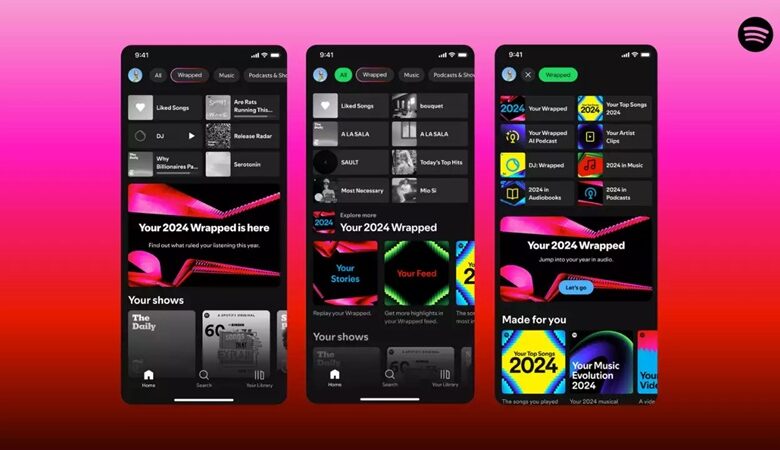The truth behind spotify wrapped – An internet favourite or just another data monitoring device ?

News Mania Desk / Piyal Chatterjee / 17th December 2024
Although it took a while, Spotify Wrapped 2024 has officially arrived. This year’s version featured a personalized AI podcast and showcased your seasonal “phases” and “moments,” in addition to the usual top five lists we anticipate. Social media is currently brimming with individuals’ favorite artists and songs of 2024, and the comparing, sharing – and in my situation, evaluating – is underway. However, beneath the surface lies something more ominous – the vast quantity of data gathering. The gathering of this data, such as the genre of music you prefer, the duration of your listening sessions, and your listening locations, is what makes Spotify Wrapped possible – but how extensive is it? The excitement for Wrapped appears to increase annually, and we may be caught off guard by enthusiasm, curiosity, and vibrant hues. Some people aren’t concerned about Spotify’s data gathering and readily overlook it for the enjoyment of Wrapped and access to thousands of songs at a single click. Some individuals might be unaware of the degree of connection between Wrapped and extensive data collection. However, it’s essential to have a candid and straightforward conversation regarding the vast amount of personal data gathered by the app and our level of comfort with it. We frequently suggest privacy software such as top VPNs to enhance your online privacy, yet in this instance, even they may find it difficult to shield you from the overwhelming wave of trackers and data gathering Spotify inundates you with. Thus, is there a solution?
Spotify, along with Spotify Wrapped, gathers nearly all kinds of personal data it can obtain. It functions through personalization – each person’s Wrapped, playlists, and suggestions are distinct, and this is not by chance. Every action you take on Spotify is monitored. Every song, artist, playlist, genre, audiobook, and podcast you enjoy is tracked. Everything you include in a playlist, what you pass over, what you play again, and what you enjoy is also logged. The time of day is noted, indicating if you listen more during the morning or evening, and importantly for Wrapped, when you typically enjoy specific music or content. For instance, if you like a morning jog or workout, lively, fast-paced music might be linked to the morning, while more relaxed, slower tunes could be reserved for the evening. Everything about this is logical. It assists Spotify in providing improved recommendations and enhances the overall experience. More concerning, however, is that your location is tracked, allowing Wrapped and Spotify to reveal what others in your country are listening to and where your favorite artists are most popular. Most personal information saved by Spotify is given when you initially create an account. The kind of data gathered depends on account type, location, and if you log in through a third party. According to Spotify’s Privacy Policy, the personal information they collect consists of your name, email address, password, phone number, gender, street address, country, and university/college (if you have a student plan). If you have a paid subscription, your credit card information and billing details will also be recorded.
Spotify likely has a deeper understanding of you than your friends and family do, and this information can be leveraged for advertising – so comply or face the consequences.
Your information is shared with advertisers and external parties to facilitate more precise advertising, and you will receive ads that pertain to the music you have listened to. Spotify has utilized the gathered data for its own Wrapped marketing. An advertisement promoting a past Wrapped year stated, “Dear individual who played ‘Sorry’ 42 times on Valentine’s Day.” “What actions did you take?” This emphasizes the highly invasive and targeted nature of the data gathered, as well as how Spotify utilizes it for its advertising efforts, to promote Wrapped, and ultimately draw in more users. When you sign in using third-party devices and applications like gaming consoles, smart speakers, or televisions, Spotify may access the information from those devices. Subscribers on premium Spotify plans pay to enjoy an ad-free experience in their app, with no disruptions to their streaming. Nevertheless, those on free plans encounter advertisements at consistent intervals – each of which can be personalized and targeted.
Along with user data and usage information, Spotify gathers technical data too. This encompasses URL details, cookies, IP addresses, network connections, browser types, and operating systems. Certain identifiers can be shielded from using tools like VPNs. Nonetheless, Spotify frequently experiences difficulties with VPNs, and problems with the app may arise when using a VPN. Because a VPN can alter your location, it may lead to violations of licensing agreements and copyright laws regarding songs. If you manage to make it function, employing a VPN might assist in evading certain technical identifiers – particularly those associated with your network and IP addresses. Nonetheless, Spotify will remain capable of identifying the specific device you’re utilizing. Additionally, all personal information is associated with your account instead of your IP address – indicating that regardless of your apparent browsing location, Spotify can continue to monitor your actions within the app.
As of now, Spotify’s Privacy Policy does not reference AI, even though AI is utilized in the app. In February 2023, the AI DJ feature debuted, offering a tailored selection of music with commentary about the tracks and artists. Spotify claims that “the DJ understands you and your musical preferences so effectively that it can explore the newest releases we believe you’ll enjoy or revisit that nostalgic playlist you kept playing last year.” In April 2024, AI technology was enhanced for playlists with the launch of AI Playlist. This function enables users to enter a specific prompt into the chat, allowing Spotify to create a playlist for you. In both situations, Spotify claims that the functionalities leverage its “advanced personalization technology”, allowing music suggestions for the user, grounded in prior listening patterns. However, there is no reference to the particular relationship between your data and generative AI.
It is evident that the sole method to prevent Spotify from tracking your listening behaviors is to remove your account. It ultimately depends on the person and their level of comfort. If you appreciate what Spotify offers, then you must acknowledge that all your activities in the app are being observed and recorded.






